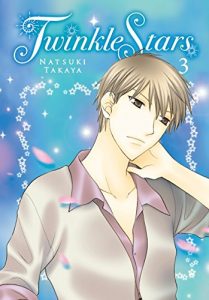By Natsuki Takaya. Released in Japan as three separate volumes by Hakusensha, serialized in the magazine Hana to Yume. Released in North America by Yen Press. Translated by Sheldon Drzka.
Endings are important, and often affect how we view the rest of the work in retrospect. Which is sometimes annoying. If you love fourth fifths of a thing, but it doesn’t stick the ending, can you really say that the whole is a failure? No, of course not. The journey to get there was spectacular. But you can say that the ending makes the series a disappointment. And I am sad to say that I felt the ending to Twinkle Stars made the series as a whole a disappointment. This is not to say I did not enjoy myself as I read it. Indeed, the first third of this omnibus was wonderful, featuring Chihiro and Sakuya finally bonding and going out on sort of dates and getting beyond all the past trauma of their lives to admit their love is wonderful. And then you hear “Sakura woke up”, and everything falls apart.
And yes, I am aware that falling apart is exactly the author’s intention. Indeed, a lot of the following volume is also excellent, showing the poignant agony of Chihiro giving up everything in order to be with Sakura, and Sakuya’s horrible pain, which she manages to work through, because she’s stronger now, thanks, in part, to Chihiro. The reactions of the others are also pretty much on point and in character. For Kanade, it’s the sympathetic ear of an adult. For Hijiri, it’s a punch, because she is the reader right now. So much of this depends on the reader being just as angry at Chihiro as the rest of the cast is, even if they don’t always show it as blatantly. The problem is that Sakura’s past was not as large a part of the story as the author intended. Indeed, I forgot she existed for volumes at a time.
That said, the good outweighs the bad for me with this final plot twist, and the emotions are well conveyed. The problem is the resolution, which feels very much like “you have this many pages to wrap everything up”. Takaya says this wasn’t the case – in fact, she says she went a volume over what she planned – but Chihiro’s revelation to Sakura as the manga draws to a close – that he’s still in love with Sakuya, and is there to make sure that Sakura gets better and nothing else. Which… would be fine, if he hadn’t kept that fact from everyone else, over the course of several years that the series timeskips forward to. Sakura, to be fair, does seem like she’ll fall apart if he’s away from her, and even after several years still seems fragile when she and Sakuya finally meet (she also still continues to use third-person when she speaks about herself, a “cutesy” Japanese thing that translates badly to English, in my opinion).
And so in the end our main couple don’t have time for much more than a reunion and tears before we hit the end. It’s very… unsatisfying. That said, before that, we had some excellent Takaya storytelling, and I’d say this is my second favorite story of hers. And let’s face it, I definitely prefer this to the trainwreck that is Fruits Basket Another, but I’ll save that rant for when it comes out in the summer. If you’ve been enjoying Twinkle Stars, there’s no reason not to get this final volume, even if I found the ending less than it could have been.



